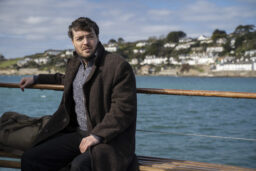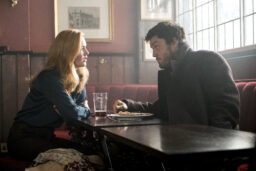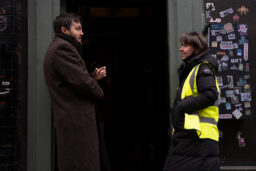The History of Cornwall
Cornwall was Strike’s true home, no matter how widely he might have wandered since.
Troubled Blood, Robert Galbraith
The village of St Mawes on the Cornish coast, where colourful houses tumble down to the beach, is where Cormoran Strike spent half his childhood. The home of his Uncle Ted and Aunt Joan there provided some stability for him and his sister Lucy while their mother, Leda, led an itinerant and unstable life. Though he spent time in London too, and lives and works in the capital now, Strike’s Cornish roots run deep.
The patron saint of the county, St. Piran, has his saint’s day on 5th March which makes this the ideal time of year to sample the rich history and culture of Cornwall and Strike’s ties to the area.
The Silkworm, Robert Galbraith
‘Cormoran – Cornish giant.’
‘That’s right,’ said Strike, surprised.
‘We published a kids’ book on English folklore last year,’ said Fisher,
Leda, Cormoran’s mother, was not a fan of Cornwall, telling her son that if she ended up in hell, it would be eternal Sunday in bloody St Mawes. The surname Strike is not a Cornish name, however. Leda met her first husband who passed through St Mawes with a travelling fair, and was only married for two weeks. Before her marriage though, Leda was a Nancarrow. As Strike’s friend and Cornish nationalist, Dave Polworth, likes to remind him, Nancarrow is a venerable Cornish name – it means valley of the stag. Leda must have had her Cornish heritage in mind when she named her son, however. Cormoran, appropriately enough given his size and build, is named after a giant who was credited with building St Michael’s Mount, a historic island linked to the Cornish mainland by a granite causeway. After the people grew weary of him raiding their livestock, Cormoran, the giant, was a victim of Jack the giant killer who trapped him in a pit.
She [Leda]’d ushered him and his sister directly onto the ferry, promising them all manner of treats up in London. Strike had bawled, trying to explain to her that he and Dave Polworth had been going to explore smugglers’ caves at the weekend, caves that might well have had no existence except in Dave’s imagination, but which were no less real to Strike for that.
Troubled Blood, Robert Galbraith
The original Cormoran was not the only law breaker along the coast. With its extensive beaches and many secret coves, Cornwall was a favourite destination for smugglers, keen to avoid the heavy taxation on imported goods demanded by the government. There are many caves which local legends say were used by the smugglers, including near St Mawes, so perhaps Dave was not just imagining them when he promised to take young Strike exploring. Cafés, bars and pubs commemorate the history of smuggling across Cornwall from Smugglers Fish and Chips near Lizard Point, to the Dog and Smuggler just over the water from St Mawes in Falmouth. It was a risky business however, and though it could pay well, justice was brutal when smugglers were caught. Robert Long, a seventeenth century smuggler, was hung in chains by the roadside near St Mawes after his execution as a warning to others. It didn’t work, and smuggling continued at a brisk pace into the nineteenth century. Tales of excise men outwitting the smugglers, and vice versa, have become a rich vein of Cornish storytelling.
…the Cornish-born Strike experienced that slight lift of the spirits the smell of the sea and the sound of lapping waves always gave him.
Troubled Blood, Robert Galbraith
Before Strike’s Aunt Joan dies, she asks for her ashes to be scattered at sea near St Mawes, and Strike, his Uncle Ted, sister Lucy and her children head out into the waters in Ted’s old sailing boat, Jowanet. The name is the Cornish version of Joan. Strike can no longer help his uncle manage the boat, as he did before an IED cost him part of his leg during his army days in Afghanistan, but he can still enjoy the pleasure of sailing, watching the surface of the sea change from rippling plain of sage and grey, to mesh of diamond-bright sparkles and inhale the smell of ozone, as familiar and comforting to him as that of beer. The stunning coastline of Cornwall attracts thousands of sailors every year, especially during Falmouth week which includes a three-day regatta of racing and parades, and traditional boat building is still a speciality in the region. Not surprising perhaps, as no part of the county is more than 25 miles from the sea. Fishing is still a vital part of the local economy, and the best restaurants in London where Strike meets clients and occasionally lovers, often boast of the Cornish crab on their menus.
‘Effing emmets.’
Troubled Blood, Robert Galbraith
‘And where would your garden be,’ asked Strike, ‘without tourists?’
‘Be ansom,’ said Polworth promptly. ‘We get a ton of local visitors, plenty of repeat business.’
Every summer Cornwall is flooded with summer visitors, looking to explore the stunning beaches, pretty villages, and varied countryside, an estimated five million of them come every year. Though they bring work to local businesses, they also put pressure on local people. Strike’s Aunt Joan and Uncle Ted are lucky they bought their home when they did, given the steep increase in prices, and the narrow roads inland can get clogged with traffic. The RNLI have to be ready to rescue amateur sailors and swimmers who get into difficulties too. The work of the local lifeguards doesn’t stop when the visitors leave, either. Strike and his half-sister Lucy manage to reach Joan in her last days thanks to the help of Dave Polworth and his fellow volunteers during the terrible storms of early 2014. Ted was one of their stalwart members after his career in the Royal Military Police, a job which inspired Strike to begin his career in the military as a Red Cap.
On his left forearm was tattooed the black and white cross of St Piran; on his right hand was a deep scar, souvenir of a close encounter with a shark.
Troubled Blood, Robert Galbraith
Dave Polworth, Strike’s friend since their primary school, pirate hunting days, proudly wears the cross of St Piran on his arm. According to legend the saint miraculously drifted across to Cornwall from Ireland on a millstone, and, as well as winning many converts to Christianity with his piety, charity, and miracles, rediscovered the art of tin-smelting. His saint’s day is celebrated with a pilgrimage across the dunes, and daffodils are laid at his cross on Penhale Sands. The cross Dave has tattooed on his arm originated in Brittany, on the other side of the English Channel, one of the six ‘Celtic’ nations, linked by ancient sea routes, along with Wales, Scotland, Ireland, and the Isle of Man.
St Mawes is named after another saint, St Maudez, who is also venerated in Brittany. His Holy Well is found in the old part of town, just up the hill from Strike’s local in St Mawes, The Victory Inn.
The Cuckoo’s Calling, Robert Galbraith
In case visitors to the area are concerned, Dave had the close encounter with a shark in Australia, not Cornwall.
The Cornish beer tasted of home, peace and long-gone security.
At the time Strike is investigating the gruesome death of Owen Quine (The Silkworm), his second case with Robin Ellacott, he hasn’t been to Cornwall for four or five years. He still carries it with him though. His favourite beer is Doom Bar, proudly brewed in Cornwall and named after a sand bank at the mouth of the river Camel. The sand bank, a site of many wrecks, was apparently cursed by a dying mermaid, but the beer has been a great success and was the best-selling cask ale throughout the UK in 2019. That means it’s available in The Tottenham, close to Strike’s offices in Denmark Street, London.
Robin understands how important Cornwall is to Strike and while they untangle the mystery of Quine’s death, she takes time to seek out a basket of Cornish beer, cider, mustard, and sweets of his birthday; and as they pick apart the disappearance of Margot Bamborough (Troubled Blood), she gives him a card with a watercolour of the port of St Mawes.
Though Joan is no more, and Strike and Lucy decide to have Ted move to London as investigations into the Universal Humanitarian Church progress, Cornwall still remains a touchstone for Strike. A familiar point of comparison and familiarity. And St Mawes in its many moods from a pretty tourist town to a place of hard stone and stiff backbone, will always be home.




